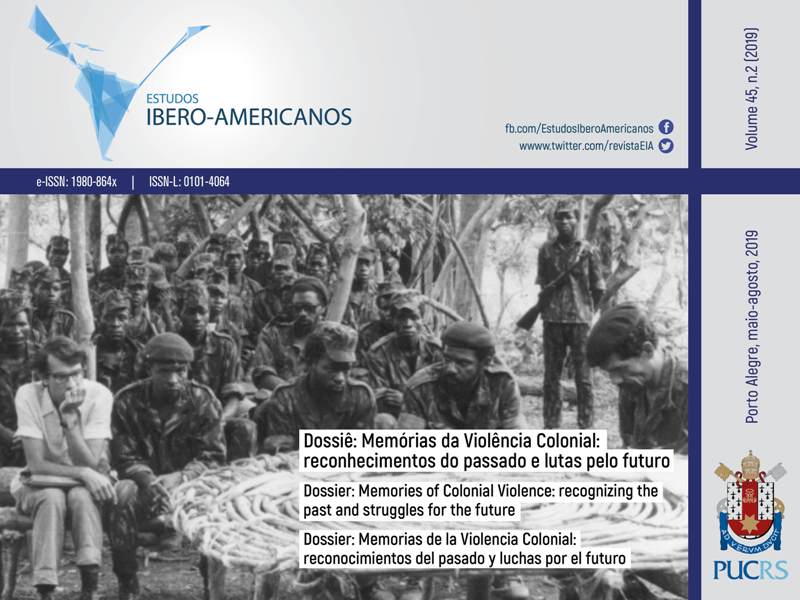The perspective of victims and contemporary social theory: between memories of the past and alternative futures
DOI:
https://doi.org/10.15448/1980-864X.2019.2.32767Keywords:
Victims. Recognition. Violence. Memory. Forgetfulness.Abstract
The article intends to explore the centrality of the recognition of the figure of the victim for understanding the legacies of colonial violence and the imagination of alternative narratives and futures. In this perspective, we seek in our text to understand, based on the contributions of Enrique Dussel, Aníbal Quijano and Boaventura de Sousa Santos, the importance of the process of recognition of victims, especially the colonial ones, in the production of a social theory engaged in overcoming policies of forgetfulness and valorization of experiences, knowledge and practices of historically silenced collectivities and subjects. Focusing on the criticisms that surround the Eurocentric and hegemonic version of Modernity (DUSSEL, 1993), the material and subjective heritages of the colonial arrangements (QUIJANO, 2005) and the possibilities of a transgressive sociology and its consequent Southern Epistemology (SOUSA SANTOS, 2010), the recognition of the victim’s figure and his experiences emerges in contemporary social theory as significant processes for the validation of silenced memories and the imagination of unthinking futures.
Downloads
References
DANDLER, Jorge. Povos indígenas e Estado de Direito na América Latina: eles têm alguma chance? In: MÉNDEZ, J. E.; O’DONNELL, G.; PINHEIRO, P. S. (orgs.). Democracia, Violência e Injustiça: o não-estado de direito na América Latina. São Paulo: Paz e Terra, 2000.
https://doi.org/10.11606/issn.2318-8235.v95i0p203-215
DUSSEL, Henrique. 1492: El encubrimiento del otro: hacia el origen del mito de la Modernidad. Madrid: Nueva Utopia, 1992.
DUSSEL, Henrique. Europa, modernidad y eurocentrismo. México: Editorial Trotta, 1993.
ELIAS, Norbert. O processo civilizador. Vol. 2. Rio de Janeiro: Zahar, 1993.
ELIAS, Norbert. Os estabelecidos e os outsiders: sociologia das relações a partir de uma pequena comunidade. Rio de Janeiro: Zahar 2000.
https://doi.org/10.5380/cam.v1i0.1561
FOUCAULT, Michel. La verdad y las formas jurídicas. Barcelona: Editorial Gedisa, 1996.
FOUCAULT, Michel. Em defesa da sociedade. São Paulo: Martins Fontes, 2003.
FRASER, Nancy. From Distribution to Recognition? Dilemmas of Justice in a “Postsocialist” Age. In: FRASER, Nancy. Justice Interruptus: Critical Reflections on the “Postsocialist” Condition. Londres: Routledge, 1997.
https://doi.org/10.1080/13545700050076223
FRASER, Nancy; HONNETH, Axel. Redistribución o reconocimiento? Un debate político-filosófico. Madrid: Ediciones Morata, 2003. (Coleção “Educación Crítica” Dirigida por Jurjo Torres Santomé).
FRASER, Nancy. Escalas de Justicia. Barcelona: Herder Editorial, 2006. (Coleção Pensamento Herder, dirigida por Manuel Cruz).
GARLAND, David. A cultura do controle: crime e ordem social na sociedade contemporânea. Rio de Janeiro: Revan, 2008.
HABERMAS, Jürgen. Teoria de la acción comunicativa I – Racionalidad de la acción y racionalización social. Madri: Taurus, 1968.
https://doi.org/10.5294/pecu.2014.17.1.6
HABERMAS, Jürgen. Teoria de la acción comunicativa II – Crítica de la razón funcionalista. Madri: Taurus, 1987b.
HALL, Stuart. A identidade cultural na pós-modernidade. Rio de Janeiro: DP&A, 2005.
HONNETH, Axel. Luta por reconhecimento: a gramática moral dos conflitos sociais. São Paulo: Editora 34, 2007.
HONNETH, Axel. Crítica del agravio moral: patologías de la sociedad contemporánea. Buenos Aires: Fondo de Cultura Económica, 2009.
HONNETH, Axel. Patologías de la Razón: historia y actualidad de la Teoría Crítica. Coleção “Conocimiento”. Buenos Aires: Katz Editores, 2009a.
MATT OS, Patrícia. O reconhecimento, entre a justiça e a identidade. Revista Lua Nova, São Paulo, v. 63, p.143-160, 2004.
https://doi.org/10.1590/s0102-64452004000300006
MENDONÇA, Ricardo Fabrino. Reconhecimento em debate: os modelos de Honneth e Fraser em sua relação com o legado habermasiano. Revista de Sociologia e Política, Curitiba, v. 29, p. 169-185, 2007.
https://doi.org/10.1590/s0104-44782007000200012
PINHEIRO, Paulo Sérgio. Introdução: o Estado de Direito e os nãoprivilegiados na América Latina. In: MÉNDEZ, J. E.; O’DONNELL, G.; PINHEIRO, P. S. (orgs.). Democracia, Violência e Injustiça: o não-estado de direito na América Latina. São Paulo: Paz e Terra, 2000.
https://doi.org/10.11606/issn.2318-8235.v95i0p203-215
PINHEIRO, Paulo Sérgio. Prefácio à edição brasileira. In: PEREIRA, Anthony. Ditadura e Repressão: o autoritarismo e o estado de direito no Brasil, no Chile e na Argentina. São Paulo: Paz e Terra, 2010.
QUIJANO, Aníbal. Colonialidade do Poder, Eurocentrismo e América Latina. In: LEHER, Roberto; SETUBAL, Mariana (org.). Pensamento Crítico e Movimentos Sociais: diálogos para uma nova práxis. São Paulo: Cortez, 2005. p. 35-95.
SOUSA SANTOS, Boaventura de. Refundación del Estado en América Latina: perspectivas desde una epistemología del Sur. Lima: II DS, 2010.
https://doi.org/10.1177/0268580914524332b
SOUZA, Jessé. Charles Taylor e a teoria crítica do reconhecimento. In: SOUZA, Jessé (org.). A modernização seletiva: uma reinterpretação do dilema brasileiro. Brasília: Editora UNB, 2000.
SPIVAK, Gayatri Chakravorty. Pode o subalterno falar? Minas Gerais: Editora UFMG, 2010.
https://doi.org/10.12957/espacoecultura.2013.12882
TAYLOR, Charles. The politics of Recognition. In: Guttman, A. (ed.). Multiculturalism: examining the politics of recognition. Princeton: Princeton University, 1994.
TAYLOR, Charles. Multiculturalismo. Lisboa: Instituto Piaget, 2005. (Coleção Epistemologia e Sociedade, v. 84).
TODOROV, Tzevetan. A conquista da América: a questão do outro. São Paulo: Martins Fontes, 1983.
WALLERSTEIN, Immanuel. The Modern World System. New York: Academic Press, 1974.
WIEVIORKA, Michel. O novo paradigma da violência. Revista Tempo Social, São Paulo, v. 9, n. 1, p. 5-41, maio 1997.
WIEVIORKA, Michel. Violence: a new approach. New Delhi: Sage Publications, 2009.
Downloads
Published
How to Cite
Issue
Section
License
Copyright (c) 2019 Clodomir Cordeiro de Matos Júnior

This work is licensed under a Creative Commons Attribution 4.0 International License.
Copyright
The submission of originals to Estudos Ibero-Americanos implies the transfer by the authors of the right for publication. Authors retain copyright and grant the journal right of first publication. If the authors wish to include the same data into another publication, they must cite Estudos Ibero-Americanos as the site of original publication.
Creative Commons License
Except where otherwise specified, material published in this journal is licensed under a Creative Commons Attribution 4.0 International license, which allows unrestricted use, distribution and reproduction in any medium, provided the original publication is correctly cited.






